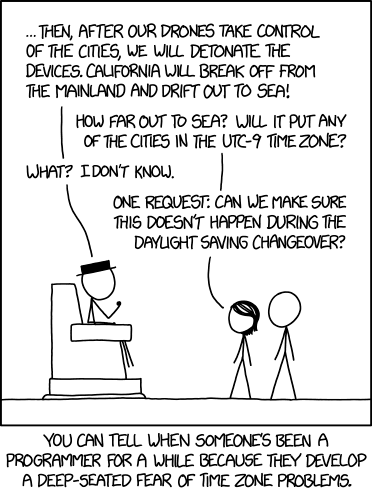I think this is probably a bug related to Daylight Saving transition. Something to do with the fact that the next occurrence was scheduled before the transition, and things get confused. Normally, that would not affect apps because the default time zone is UTC, but here the local time zone adds a level of complexity.
@mathewc this is the one we chatted about.

(originally posted at https://github.com/Azure/azure-functions-host/issues/1534 and opened as a separate issue by request)
I had a function today that didn't run at its scheduled time of 6 p.m. Eastern time. It's been running fine for many months. WEBSITE_TIME_ZONE is set to Eastern Standard Time.
Site: https://fn-sv-bills-prod.azurewebsites.net/ Function Name: IssueInvoices CRON expression: 0 0 18 5 Expected Invocation: 2018-03-16T18:00:00-04:00 (2018-03-16T22:00:00Z)
When I logged into the portal, I ran the function manually and it worked (that's the invocation at 2018-03-16T18:23:09.0252356-04:00). Curious, I restarted the site via the portal. A few minutes later, Functions seemed to have realized it had missed the previously scheduled invocation, and ran it again at 2018-03-16T18:28:06.8759704-04:00.
I added WEBSITE_USE_PLACEHOLDER in attempt to prevent it from happening again, though I'm not sure if the defect @davidebbo mentioned above with WEBSITE_TIME_ZONE is still at play here.
As an aside, in a separate functions app, I have a function that normally runs at 5 p.m. Eastern every weekday:
Site: https://fn-sv-labels-prod.azurewebsites.net/ Function Name: DispatchVolumePostageReport CRON expression: 0 0 17 1-5
On Monday, it executed at 6 p.m. instead of 5 p.m., an hour later than usual. On Tuesday, it was back on its 5 p.m. schedule, and I hadn't made any changes.
What has me curious is that the next invocation following the switch to Daylight Saving Time was an hour late, but after that next invocation got itself back on track. I almost wonder if my IssueInvoices job that didn't run as expected also would have been an hour late since it would have been the first invocation after the DST change. However, I'm not sure how Azure is scheduling and keeping track of the next invocation internally for that to be a possible source of a bug?